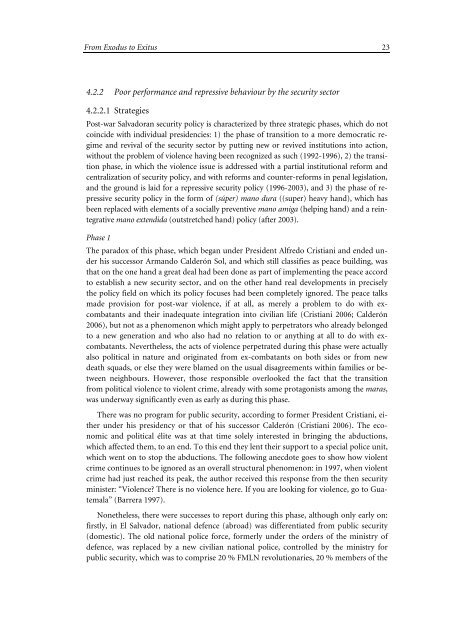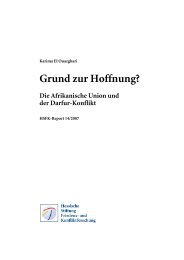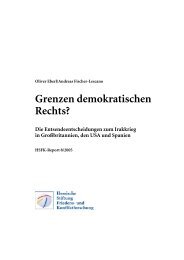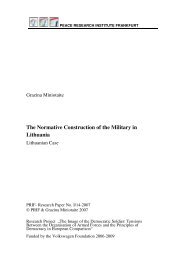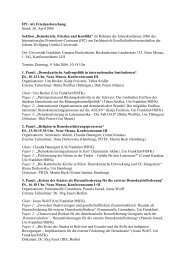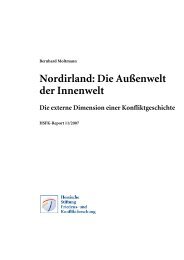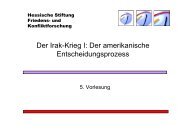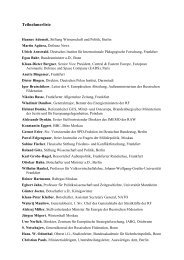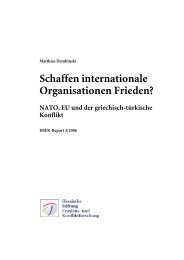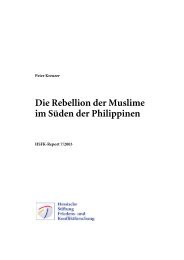From Exodus to Exitus Causes of post-war violence in El ... - eDoc
From Exodus to Exitus Causes of post-war violence in El ... - eDoc
From Exodus to Exitus Causes of post-war violence in El ... - eDoc
You also want an ePaper? Increase the reach of your titles
YUMPU automatically turns print PDFs into web optimized ePapers that Google loves.
<strong>From</strong> <strong>Exodus</strong> <strong>to</strong> <strong>Exitus</strong> 23<br />
4.2.2 Poor performance and repressive behaviour by the security sec<strong>to</strong>r<br />
4.2.2.1 Strategies<br />
Post-<strong>war</strong> Salvadoran security policy is characterized by three strategic phases, which do not<br />
co<strong>in</strong>cide with <strong>in</strong>dividual presidencies: 1) the phase <strong>of</strong> transition <strong>to</strong> a more democratic regime<br />
and revival <strong>of</strong> the security sec<strong>to</strong>r by putt<strong>in</strong>g new or revived <strong>in</strong>stitutions <strong>in</strong><strong>to</strong> action,<br />
without the problem <strong>of</strong> <strong>violence</strong> hav<strong>in</strong>g been recognized as such (1992-1996), 2) the transition<br />
phase, <strong>in</strong> which the <strong>violence</strong> issue is addressed with a partial <strong>in</strong>stitutional reform and<br />
centralization <strong>of</strong> security policy, and with reforms and counter-reforms <strong>in</strong> penal legislation,<br />
and the ground is laid for a repressive security policy (1996-2003), and 3) the phase <strong>of</strong> repressive<br />
security policy <strong>in</strong> the form <strong>of</strong> (súper) mano dura ((super) heavy hand), which has<br />
been replaced with elements <strong>of</strong> a socially preventive mano amiga (help<strong>in</strong>g hand) and a re<strong>in</strong>tegrative<br />
mano extendida (outstretched hand) policy (after 2003).<br />
Phase 1<br />
The paradox <strong>of</strong> this phase, which began under President Alfredo Cristiani and ended under<br />
his successor Armando Calderón Sol, and which still classifies as peace build<strong>in</strong>g, was<br />
that on the one hand a great deal had been done as part <strong>of</strong> implement<strong>in</strong>g the peace accord<br />
<strong>to</strong> establish a new security sec<strong>to</strong>r, and on the other hand real developments <strong>in</strong> precisely<br />
the policy field on which its policy focuses had been completely ignored. The peace talks<br />
made provision for <strong>post</strong>-<strong>war</strong> <strong>violence</strong>, if at all, as merely a problem <strong>to</strong> do with excombatants<br />
and their <strong>in</strong>adequate <strong>in</strong>tegration <strong>in</strong><strong>to</strong> civilian life (Cristiani 2006; Calderón<br />
2006), but not as a phenomenon which might apply <strong>to</strong> perpetra<strong>to</strong>rs who already belonged<br />
<strong>to</strong> a new generation and who also had no relation <strong>to</strong> or anyth<strong>in</strong>g at all <strong>to</strong> do with excombatants.<br />
Nevertheless, the acts <strong>of</strong> <strong>violence</strong> perpetrated dur<strong>in</strong>g this phase were actually<br />
also political <strong>in</strong> nature and orig<strong>in</strong>ated from ex-combatants on both sides or from new<br />
death squads, or else they were blamed on the usual disagreements with<strong>in</strong> families or between<br />
neighbours. However, those responsible overlooked the fact that the transition<br />
from political <strong>violence</strong> <strong>to</strong> violent crime, already with some protagonists among the maras,<br />
was underway significantly even as early as dur<strong>in</strong>g this phase.<br />
There was no program for public security, accord<strong>in</strong>g <strong>to</strong> former President Cristiani, either<br />
under his presidency or that <strong>of</strong> his successor Calderón (Cristiani 2006). The economic<br />
and political élite was at that time solely <strong>in</strong>terested <strong>in</strong> br<strong>in</strong>g<strong>in</strong>g the abductions,<br />
which affected them, <strong>to</strong> an end. To this end they lent their support <strong>to</strong> a special police unit,<br />
which went on <strong>to</strong> s<strong>to</strong>p the abductions. The follow<strong>in</strong>g anecdote goes <strong>to</strong> show how violent<br />
crime cont<strong>in</strong>ues <strong>to</strong> be ignored as an overall structural phenomenon: <strong>in</strong> 1997, when violent<br />
crime had just reached its peak, the author received this response from the then security<br />
m<strong>in</strong>ister: “Violence? There is no <strong>violence</strong> here. If you are look<strong>in</strong>g for <strong>violence</strong>, go <strong>to</strong> Guatemala”<br />
(Barrera 1997).<br />
Nonetheless, there were successes <strong>to</strong> report dur<strong>in</strong>g this phase, although only early on:<br />
firstly, <strong>in</strong> <strong>El</strong> Salvador, national defence (abroad) was differentiated from public security<br />
(domestic). The old national police force, formerly under the orders <strong>of</strong> the m<strong>in</strong>istry <strong>of</strong><br />
defence, was replaced by a new civilian national police, controlled by the m<strong>in</strong>istry for<br />
public security, which was <strong>to</strong> comprise 20 % FMLN revolutionaries, 20 % members <strong>of</strong> the


